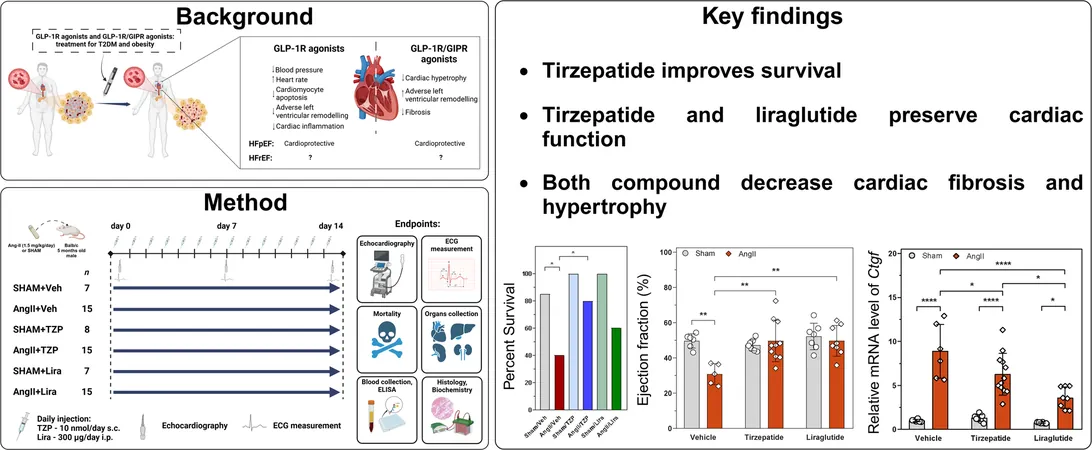
Breakthrough in Heart Failure Treatment: Tirzepatide vs. Liraglutide
2025-06-14
Author: Ming
Revolutionary Findings on Tirzepatide in Heart Health
In a groundbreaking study, researchers revealed that tirzepatide, a dual GIP/GLP-1 receptor co-agonist, significantly preserves cardiac function and boosts survival rates in mice with angiotensin II-induced heart failure. This contrasts sharply with liraglutide, a well-known GLP-1 analogue, which offers only moderate benefits.
The Study: Key Details
Conducted under strict ethical standards, the study used male Balb/c mice aged five months. The animals were subjected to a rigorous experimental setup involving angiotensin II to induce heart failure (HF) and then treated with either tirzepatide or liraglutide for two weeks.
Startling Results on Mortality Rates
The results were eye-opening. In the control group treated with vehicle alone, 60% of the mice perished in the 14-day observation period. Remarkably, in the tirzepatide group, only 20% of the mice died, marking a striking juxtaposition.
Weight Loss and Cardiac Function
Both tirzepatide and liraglutide led to significant weight loss among the treated mice—an essential factor, especially given that obesity is a known risk factor for heart failure. Notably, echocardiographic assessments showed that tirzepatide was effective at preserving cardiac function even after just one week of treatment.
Impact on Cardiac Remodeling and Fibrosis
Continuous angiotensin II infusion triggered deleterious changes in the heart. However, treatment with both tirzepatide and liraglutide attenuated cardiac remodeling, reducing fibrosis and hypertrophy markers.
Mechanisms of Action: What Sets Tirzepatide Apart?
The unique mechanism of action of tirzepatide, which co-activates GIPR alongside GLP-1R, offers additional cardioprotective benefits that may not be present in singular GLP-1 treatments like liraglutide. This includes the potential to directly influence heart cells and reduce inflammation and fibrosis.
Potential Game Changer for Heart Failure Treatment
The implications of these findings are profound for treating heart failure, especially in populations burdened with obesity and other cardiometabolic factors. With tirzepatide showing not just efficacy in improving heart function but also substantial survival benefits, doctors may soon have a powerful new tool at their disposal.
Conclusion: Why this Matters
In an era where cardiovascular diseases are on the rise, the need for effective therapies has never been greater. Tirzepatide’s potential to significantly enhance survival in heart failure patients positions it as a front-runner in the race for better treatment options. As clinical trials progress, the future looks promising for both patients and healthcare providers.



 Brasil (PT)
Brasil (PT)
 Canada (EN)
Canada (EN)
 Chile (ES)
Chile (ES)
 Česko (CS)
Česko (CS)
 대한민국 (KO)
대한민국 (KO)
 España (ES)
España (ES)
 France (FR)
France (FR)
 Hong Kong (EN)
Hong Kong (EN)
 Italia (IT)
Italia (IT)
 日本 (JA)
日本 (JA)
 Magyarország (HU)
Magyarország (HU)
 Norge (NO)
Norge (NO)
 Polska (PL)
Polska (PL)
 Schweiz (DE)
Schweiz (DE)
 Singapore (EN)
Singapore (EN)
 Sverige (SV)
Sverige (SV)
 Suomi (FI)
Suomi (FI)
 Türkiye (TR)
Türkiye (TR)
 الإمارات العربية المتحدة (AR)
الإمارات العربية المتحدة (AR)